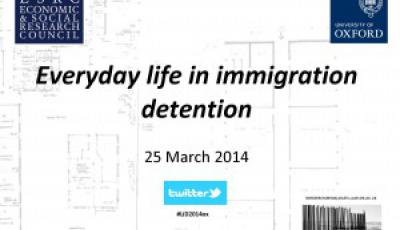
The seminar began with a session focusing on the experiences of everyday life in immigration detention. Hindpal Singh Bhui, an inspection Team Leader in HM Inspectorate of Prisons (HMIP), explained the powers and aims of the HMIP in the UK as a key independent institution monitoring daily aspects of life in detention. Most of HMIP’s recommendations are accepted by the custodial companies, although fewer of them are achieved. For Hindpal, the power of HMIP rests in its independence and impartiality, as well as in its powers to communicate with the media and publish its findings. HMIP inspectors deploy a wide range of skills to monitor everyday life, and benefit from a mixed-methods approach to data collection.
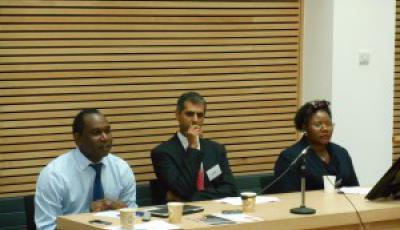
Kizza’s experience of detention was similarly powerful and painful, but had a different focus. Kizza had not been living in Britain for long when he was detained. Unlike Beatrice, he had not anticipated that he might be confined, and it took him some time to understand what was happening. Like Beatrice, Kizza resisted his deportation, yet he found it very difficult to obtain legal representation. In the end, it was largely due to assistance he received from the local Member of Parliament for the area in which Harmondsworth IRC that his case began to change. Kizza was detained in a number of IRCs and found the movements particularly difficult to deal with and understand. Like Beatrice, he too was released and has now built a life in the UK. Kizza and Beatrice took different paths after detention in deciding whether to challenge their detention in the courts, and both found that their choices helped build a future in the UK. Both are working towards making the voices of detainees heard outside detention.
In the discussion that followed the first panel, a number of additional themes were examined in more detail. Considerable time was spent talking about staff and their relationships with detainees. The casual dehumanisation of detainees (e.g., by reference to detainees by their numbers rather than their individual names) was widely criticised, while some account was given of the positive support shared among detainees. Differing views were offtered about the role of activities and, in particular, the legitimacy of paid work in detention as helping to pass the time and manage stress.
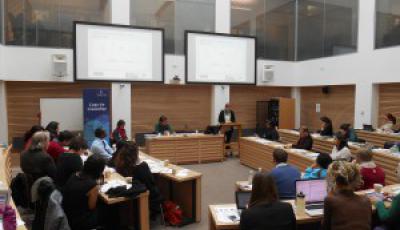
Following Sarah, Thomas Ugelvik presented on his field research at Trandum detention centre in Norway, discussing the ways that detention centres aim to achieve legitimacy. In Norway, this was achieved by criminalising immigration offences and ‘prisonising’ detention centres in terms of the physical space, staffing, and procedures. Thomas indicated that the ‘improvements’ of the physical conditions at Trandum were also driven by high levels of media coverage and public opinion.
The group discussion following the second session considered some the practicalities of doing research in detention, particularly gaining and maintaining access, and building trust. Some participants had been denied permission to interview detainees and wanted to advice on how to promote a more research friendly environment. Broader issues regarding the purpose and legitimacy of immigration detention were also explored. There was some discussion as to whether the 'prisonisation' of detention produced ‘better’ conditions for detainees, and what sorts of alternatives to detention are available.
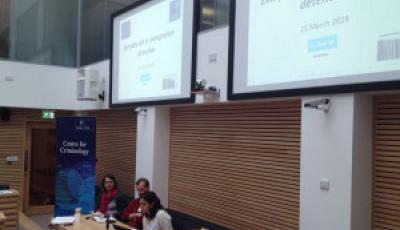
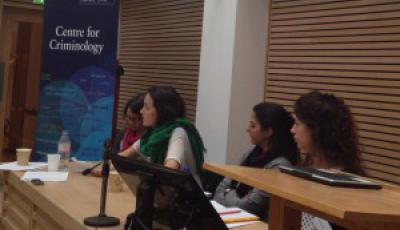
The final speakers for the day, Andriani Fili and Angeliki Pangoulia, described the parlous state of immigration detention in Greece. They described physical and material conditions of detention as miserable and inadequate yet the Greek media and public reaction are largely indifferent. Detainees in Greece have no access to legal representation, and there is little recognition of refugee and torture experiences among those who are detained. The poor conditions were considered by the Greek government to be a necessary method of deterrence for other migrants. NGOs in Greece felt powerless to voice their concerns, monitor the situation, or influence policy.
All told, the ‘Everyday Life in Immigration Detention’ seminar revealed a series of common concerns within some institutional and regional differences. Dehumanisation, inadequate access to legal aid, and the treatment of vulnerable persons were all common complaints. At the same time in every instance, examples of resistance, support, and sympathetic staff were also identified. As ever, it seems, much work remains to be done on detention, with, by, and for detainees.
The next seminar in the ESRC-funded series, entitled ‘Research and the Relations between Prison and Detention,’ will be held on 20 June 2014 at the University of Birmingham. Convened by Dominique Moran, this seminar will focus on the challenges of research in spaces of imprisonment and detention. Click here to register.
Share:








